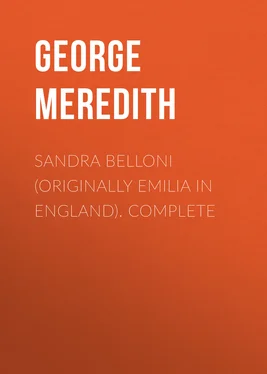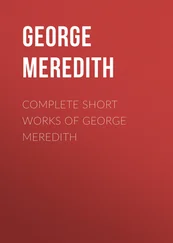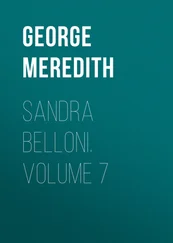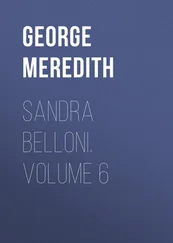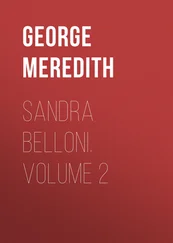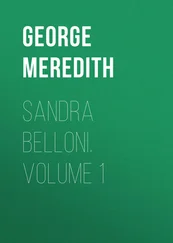George Meredith - Sandra Belloni (originally Emilia in England). Complete
Здесь есть возможность читать онлайн «George Meredith - Sandra Belloni (originally Emilia in England). Complete» — ознакомительный отрывок электронной книги совершенно бесплатно, а после прочтения отрывка купить полную версию. В некоторых случаях можно слушать аудио, скачать через торрент в формате fb2 и присутствует краткое содержание. Жанр: foreign_prose, literature_19, foreign_antique, на английском языке. Описание произведения, (предисловие) а так же отзывы посетителей доступны на портале библиотеки ЛибКат.
- Название:Sandra Belloni (originally Emilia in England). Complete
- Автор:
- Жанр:
- Год:неизвестен
- ISBN:нет данных
- Рейтинг книги:4 / 5. Голосов: 1
-
Избранное:Добавить в избранное
- Отзывы:
-
Ваша оценка:
- 80
- 1
- 2
- 3
- 4
- 5
Sandra Belloni (originally Emilia in England). Complete: краткое содержание, описание и аннотация
Предлагаем к чтению аннотацию, описание, краткое содержание или предисловие (зависит от того, что написал сам автор книги «Sandra Belloni (originally Emilia in England). Complete»). Если вы не нашли необходимую информацию о книге — напишите в комментариях, мы постараемся отыскать её.
Sandra Belloni (originally Emilia in England). Complete — читать онлайн ознакомительный отрывок
Ниже представлен текст книги, разбитый по страницам. Система сохранения места последней прочитанной страницы, позволяет с удобством читать онлайн бесплатно книгу «Sandra Belloni (originally Emilia in England). Complete», без необходимости каждый раз заново искать на чём Вы остановились. Поставьте закладку, и сможете в любой момент перейти на страницу, на которой закончили чтение.
Интервал:
Закладка:
“It was the beginning of all our misfortunes! My father was taken and locked up in a place as a tipsy man. That he has never forgiven the English for! It has made me and my mother miserable ever since. My mother is sure it is all since that night. Do you know, I remember, though I was so young, that I felt the music—oh! like a devil in my bosom? Perhaps it was, and it passed out of me into him. Do you think it was?”
Wilfrid answered: “Well, no! I shouldn’t think you had anything to do with the devil.” Indeed, he was beginning to think her one of the smallest of frocked female essences.
“I lost my piano through it,” she went on. “I could not practise. I was the most miserable creature in all the world till I fell in love with my harp. My father would not play to get money. He sat in his chair, and only spoke to ask about meal-time, and we had no money for food, except by selling everything we had. Then my piano went. So then I said to my mother, I will advertize to give lessons, as other people do, and make money for us all, myself. So we paid money for a brass-plate, and our landlady’s kind son put it up on the door for nothing, and we waited for pupils to come. I used to pray to the Virgin that she would blessedly send me pupils, for my poor mother’s complaints were so shrill and out of tune it’s impossible to tell you what I suffered. But by-and-by my father saw the brass-plate. He fell into one of his dreadful passions. We had to buy him another wig. His passions were so expensive: my mother used to say, ‘There goes our poor dinner out of the window!’ But, well! he went to get employment now. He can, always, when he pleases; for such a touch on the violin as my father has, you never heard. You feel yourself from top to toe, when my father plays. I feel as if I breathed music like air. One day came news from Italy, all in the newspaper, of my father’s friends and old companions shot and murdered by the Austrians. He read it in the evening, after we had a quiet day. I thought he did not mind it much, for he read it out to us quite quietly; and then he made me sit on his knee and read it out. I cried with rage, and he called to me, ‘Sandra! Peace!’ and began walking up and down the room, while my mother got the bread and cheese and spread it on the table, for we were beginning to be richer. I saw my father take out his violin. He put it on the cloth and looked at it. Then he took it up, and laid his chin on it like a man full of love, and drew the bow across just once. He whirled away the bow, and knocked down our candle, and in the darkness I heard something snap and break with a hollow sound. When I could see, he had broken it, the neck from the body—the dear old violin! I could cry still. I—I was too late to save it. I saw it broken, and the empty belly, and the loose strings! It was murdering a spirit—that was! My father sat in a corner one whole week, moping like such an old man! I was nearly dead with my mother’s voice. By-and-by we were all silent, for there was nothing to eat. So I said to my mother, ‘I will earn money.’ My mother cried. I proposed to take a lodging for myself, all by myself; go there in the morning and return at night, and give lessons, and get money for them. My landlady’s good son gave me the brass-plate again. Emilia Alessandra Belloni! I was glad to see my name. I got two pupils very quickly one, an old lady, and one, a young one. The old lady—I mean, she was not grey—wanted a gentleman to marry her, and the landlady told me—I mean my pupil—it makes me laugh—asked him what he thought of her voice: for I had been singing. I earned a great deal of money: two pounds ten shillings a week. I could afford to pay for lessons myself, I thought. What an expense! I had to pay ten shillings for one lesson! Some have to pay twenty; but I would pay it to learn from the best masters;—and I had to make my father and mother live on potatoes, and myself too, of course. If you buy potatoes carefully, they are extremely cheap things to live upon, and make you forget your hunger more than anything else.
“I suppose,” added Emilia, “you have never lived upon potatoes entirely? Oh, no!”
Wilfrid gave a quiet negative.
“But I was pining to learn, and was obliged to keep them low. I could pitch any notes, and I was clear but I was always ornamenting, and what I want is to be an accurate singer. My music-master was a German—not an Austrian—oh, no!—I’m sure he was not. At least, I don’t think so, for I liked him. He was harsh with me, but sometimes he did stretch his fingers on my head, and turn it round, and say words that I pretended not to think of, though they sent me home burning. I began to compose, and this gentleman tore up the whole sheet in a rage, when I showed it him; but he gave me a dinner, and left off charging me ten shillings—only seven, and then five—and he gave me more time than he gave others. He also did something which I don’t know yet whether I can thank him for. He made me know the music of the great German. I used to listen: I could not believe such music could come from a German. He followed me about, telling me I was his slave. For some time I could not sleep. I laughed at myself for composing. He was not an Austrian: but when he was alive he lived in Vienna, the capital of Austria. He ate Austrian bread, and why God gave him such a soul of music I never can think!—Well, by-and-by my father wanted to know what I did in the day, and why they never had anything but potatoes for dinner. My mother came to me, and I told her to say, I took walks. My father said I was an idle girl, and like my mother—who was a slave to work. People are often unjust! So my father said he would watch me. I had to cross the park to give a lesson to a lady who had a husband, and she wanted to sing to him to keep him at home in the evening. I used to pray he might not have much ear for music. One day a gentleman came behind me in the park. He showed me a handkerchief, and asked me if it was mine. I felt for my own and found it in my pocket. He was certain I had dropped it. He looked in the corners for the name, I told him my name—Emilia Alessandra Belloni. He found A.F.G. there. It was a beautiful cambric handkerchief, white and smooth. I told him it must be a gentleman’s, as it was so large; but he said he had picked it up close by me, and he could not take it, and I must; and I was obliged to keep it, though I would much rather not. Near the end of the park he left me.”
At this point Wilfrid roused up. “You met him the next day near the same place?” he remarked.
She turned to him with astonishment on her features. “How did you know that? How could you know?”
“Sort of thing that generally happens,” said Wilfrid.
“Yes; he was there,” Emilia slowly pursued, controlling her inclination to question further. “He had forgotten about the handkerchief, for when I saw him, I fancied he might have found the owner. We talked together. He told me he was in the Army, and I spoke of my father’s playing and my singing. He was so fond of music that I promised him he should hear us both. He used to examine my hand, and said they were sensitive fingers for playing. I knew that. He had great hopes of me. He said he would give me a box at the Opera, now and then. I was mad with joy; and so delighted to have made a friend. I had never before made a rich friend. I sang to him in the park. His eyes looked beautiful with pleasure. I know I enchanted him.”
“How old were you then?” inquired Wilfrid.
“Sixteen. I can sing better now, I know; but I had voice then, and he felt that I had. I forgot where we were, till people stood round us, and he hurried me away from them, and said I must sing to him in some quiet place. I promised to, and he promised he would have dinner for me at Richmond Hill, in the country, and he would bring friends to hear me.”
Читать дальшеИнтервал:
Закладка:
Похожие книги на «Sandra Belloni (originally Emilia in England). Complete»
Представляем Вашему вниманию похожие книги на «Sandra Belloni (originally Emilia in England). Complete» списком для выбора. Мы отобрали схожую по названию и смыслу литературу в надежде предоставить читателям больше вариантов отыскать новые, интересные, ещё непрочитанные произведения.
Обсуждение, отзывы о книге «Sandra Belloni (originally Emilia in England). Complete» и просто собственные мнения читателей. Оставьте ваши комментарии, напишите, что Вы думаете о произведении, его смысле или главных героях. Укажите что конкретно понравилось, а что нет, и почему Вы так считаете.
